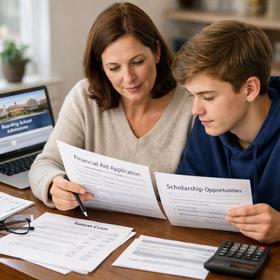International Students: Visas and More
If you live overseas and are not an American citizen, and are considering sending your child to a boarding school in the United States, your child will need a student visa to enter the United States.
- Your child will also need to show fluency in the English language as evidenced by passing the Test of English as a Foreign Language (TOEFL).
- The process of applying for a student visa begins with an American boarding school issuing a Form I-20.
The I-20 Form
Not every boarding school is certified by the United States Immigration Service to accept foreign students. Why is that important?
- Always confirm that the school you are interested in is a Student and Exchange Visitor Program (SEVP) certified school.
- If the school is not SEVP-certified to accept international students, it cannot issue the I-20 form, which is the first step in applying for and obtaining a student visa from the U.S. Immigration Service.
- Once you receive the I-20 from the school you chose to attend, you will pay the I-901 Student and Exchange Visitor Information System (SEVIS) Fee. As of May 2025 that fee is $350.
- The Immigration Service will not allow your child to enter the United States as a student without the proper documentation.
Pay Attention to The Deadlines
Applying for admission to an American boarding school requires staying organized and on top of deadlines throughout the admissions process.
- Hire a professional consultant to oversee the admissions process, which is time-consuming and very detailed.
- Approval for a student visa typically takes 3-4 months.
- The visa also requires detailed documentation in support of your child's application.
- For your peace of mind, I recommend consulting an immigration attorney in your country who specializes in U.S. immigration matters.
The Student Visa Application Process
1. Complete and submit your school application.
You must follow the customary admissions process for each boarding school on your list to the letter.
- That includes submitting academic transcripts and teacher recommendations as well as scheduling an interview with the school.
- American boarding schools will schedule in-person interviews with a visiting school representative whenever possible.
- Many schools also use Zoom or other video conferencing apps to interview parents and students.
- Be sure to register for the TOEFL as well as the school's standardized admissions test.
Once the school has accepted you, it will give you a Form I-20, which allows you to apply for a student visa.
- The Form I-20 is the Immigration Service's Certificate of Eligibility for Nonimmigrant (F-1) Student Status.
- It is part of the Student and Visitor Exchange Information System (SEVIS), which tracks information about all students coming to the United States.
- The next step is to pay the I-901 SEVIS fee.
- This fee must be paid before you have your visa interview at the American embassy or consulate in your country.
The Department of Homeland Security has detailed instructions for you to follow, both in written and video format.
2. Complete and submit your visa application.
The student visa application and interview is a detailed process requiring you to attend an interview with a U.S. Consular official.
- You will have to complete many U.S. Immigration Service forms.
- Check with your local U.S. Consulate for details about payment.
- Applying for visas takes a lot of time.
- Allow at least 60 days, and be prepared for the process to take much longer.
- Do not wait until the last minute to make your visa interview appointment.
- Most U.S. embassies in major urban areas overseas process thousands of visa applications daily.
- Allow for long waiting periods and the inevitable backlogs and delays.
3. Schedule your visa application interview.
Students applying for a student visa must meet with a U.S. Consular official at an American Embassy in their home country.
- Spend time preparing for that interview.
- Know what questions will be asked.
- Understand how serious this part of the process is.
- Schedule the visa interview appointments well in advance.
4. Have all documentation in order.
Your passport must be valid for at least six months after the date of entry.
- Academic documentation such as TOEFL test results, SSAT scores, and transcripts of the applicant's high school work will also be reviewed.
- Certified documentation of adequate financial resources is required.
Your child's documentation must be in order when he arrives at the border to enter the United States. If it is not in order, in that case, the Immigration Officer may allow you to enter the United States for 30 days on a Form I-515A “Notice to Student or Exchange"e Visitor.”
- You will have 30 days to submit your documentation.
- If you fail to do so, you will have to leave the United States.
5. Pay attention to your visa restrictions.
Student visas have strict time limits. Adhere to those.
- Overstaying your visa by even one day can void it.
- Do not change anything about your visa terms without severe consequences unless the Immigration Service approves.
- As you have probably figured out by now, if you have read this far, the American visa process is exact and detailed.
- I strongly recommend that you complete the process with the help of a knowledgeable immigration attorney in your area.
If you forget to complete even one form or do not submit the correct documentation for your finances and citizenship, your visa application will not be processed.
- In that case, the U.S. consular official will deny the visa, and you will have to start the process over.
- Keep certified copies of all documentation in your possession for your peace of mind.
- Scan and save electronic copies of all documents to your Google Drive or OneDrive so that you can access them quickly as needed.
Thorough preparation is essential.
Caution your child about the need to follow the rules and procedures you lay out.
- Getting admitted into the United States is not a time for improvisation.
- Teach your child to call or text you with questions and concerns as they occur.
- Review your child's social media accounts and purge anything that a U.S. Border officer might find questionable.
To prepare your child for the visa interview and potential scrutiny at the border, hire a professional immigration consultant who specializes in student visas.
The consultant can:
- Conduct mock interviews in U.S. English to assess your child's ability to understand and respond to questions.
- Provide feedback on clarity, tone, and body language.
- Help your child anticipate and prepare for common questions and scenarios.
- Simulate the border crossing experience to ensure your child is familiar with the process.
Given the potential complexities and uncertainties of the border crossing process, it's also highly recommended that parents consider accompanying their child to the United States.
- Accompanying your child will allow you to provide support and mobilize resources if any issues arise during the entry process, such as detention or denial of entry.
- By working with a professional immigration consultant and being prepared to provide support, you can help ensure your child has a smoother transition to their American boarding school experience.
Questions? Contact us on Facebook & Instagram, and YouTube. @boardingschoolreview
#boardingschools #internationalstudents #BoardingSchoolAdmissions #StudyAbroad #StudentVisas #AdmissionsTips















